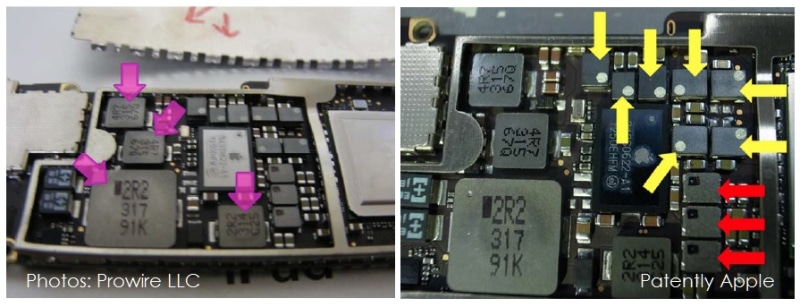source: Patently Apple article
Patently Apple is first to discover a new patent infringement lawsuit filed against Apple. We’ve learned that the Patent Troll going by the name ‘Prowire LLC’ had acquired a patent from Taiwan for the sole purpose of suing profitable high profile companies like Apple, and not to make a product of any kind. Prowire claims that Apple’s iPad 4 infringes on their acquired patent relating to inductors. The acquired patent notes in its background that “Inductors are considered one of the most common devices in the electronic/electric industry.” And yet somehow, even though Apple owns IP covering inductors that work in their patented iDevices, Prowire believes that Apple had to steal or infringe their acquired invention from Taiwan to make an iPad run right.
Sarcasm aside, Prowire’s patent infringement lawsuit is based on October 20004U.S. patent 6,137,390 titled “Inductors with minimized EMI effect and the method of manufacturing the same.” The patent, as noted below, was originally assigned to Industrial Technology Research Institute in Taiwan and invented by two Taiwanese citizens.
Prowire states in their complaint before the court, that the iPad 4 infringes on at least claim 1 of their patent that states the following: An inductor with enhanced inductance comprising: (a) a magnetic core; (b) an electrically conducting coil wound about said magnetic core; (c) a magnetic resin layer compression-molded to embed at least a portion of an outer periphery of said electrically conducting coil; and (d) wherein said magnetic resin layer contains a magnetic powder dispersed in a polymer resin.
Prowire claims in their filing specifically that “The inductors used in Defendant’s consumer electronics products including, for example and without limitation, its line of iPad 4 tablet computers, meet each and every element of at least claim 1 of the patent-in-suit. For example and without limitation, the inductors shown in the following photographs [below] meet each and every element of at least claim 1 of the patent-in-suit:
The inductors used in Defendant’s iPad 4 tablet computers have enhanced inductance. (image source: Patently Apple)
The inductors used in Defendant’s iPad 4 tablet computers contain a magnetic core.
The inductors used in Defendant’s iPad 4 tablet computers contain an electrically conducting coil wound about said magnetic core. (Image source: Patently Apple)
The magnetic resin layer contained in the inductors used in Defendant’s iPad 4 tablet computers contains a magnetic powder dispersed in a polymer resin.
Defendant has infringed and continues to infringe (literally and/or under the doctrine of equivalents) one or more claims of the patent-in-suit in this judicial district and elsewhere in the United States, by importing into the United States consumer electronics products that incorporate inductor devices made by a process patented in the United States, including, for example and without limitation, its line of iPad 4 tablet computers.
Claim 11 of the patent-in-suit states:
A method for making inductors with enhanced inductance comprising the steps of: (a) winding an electrically conducting coil about a magnetic core; (b) forming a magnetic resin layer by compression molding to embed at least a portion of an outer periphery of said electrically conducting coil; and (c) wherein said magnetic resin layer matrix contains a magnetic powder dispersed in a polymer resin.
The inductors used in Defendant’s consumer electronics products imported into the United States including, for example and without limitation, its line of iPad 4 tablet computers, were made using a method that practices each and every step of claim 11 of the patent-in-suit.
The inductors used in Defendant’s iPad 4 tablet computers have enhanced inductance.
The inductors used in Defendant’s iPad 4 tablet computers were made using a method that includes winding an electrically conducting coil about a magnetic core.
The inductors used in Defendant’s iPad 4 tablet computers were made using a method that includes forming a magnetic resin layer by compression molding to embed at least a portion of an outer periphery of said electrically conducting coil.
Defendant has been at no time, either expressly or impliedly, licensed under the patent-in-suit.
Defendant’s acts of infringement have caused damage to Prowire. Prowire is entitled to recover from Defendant the damages sustained by Prowire as a result of the wrongful acts of Defendant in an amount subject to proof at trial.
To the extent required by law, Prowire has complied with the provisions of 35 U.S.C. § 287.
Prowire reserves the right to amend to assert a claim of willful infringement if the evidence obtained in discovery supports such assertion.”
The patent infringement case presented in today’s report was filed in the Delaware District Court, Wilmington Office, New Castle on March 2, 2017. At present, no Judge has been assigned to the case. The patent in this lawsuit can be reviewed in full here
